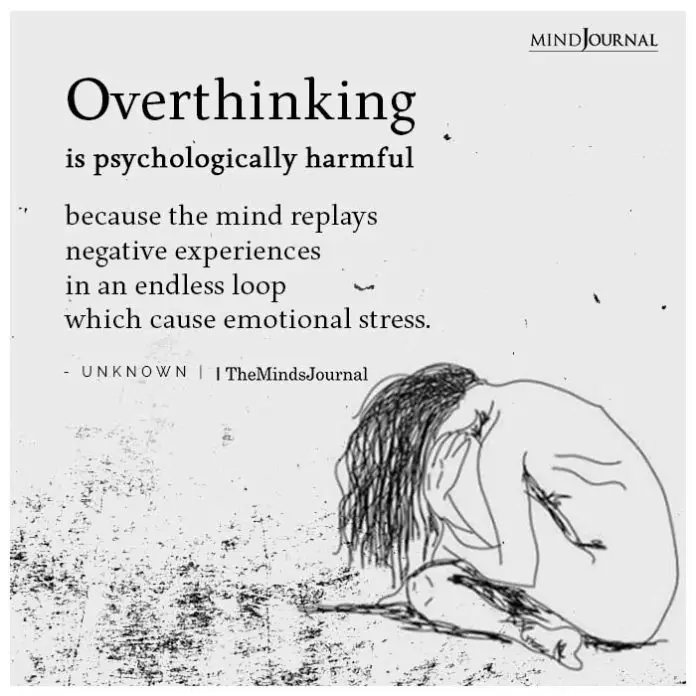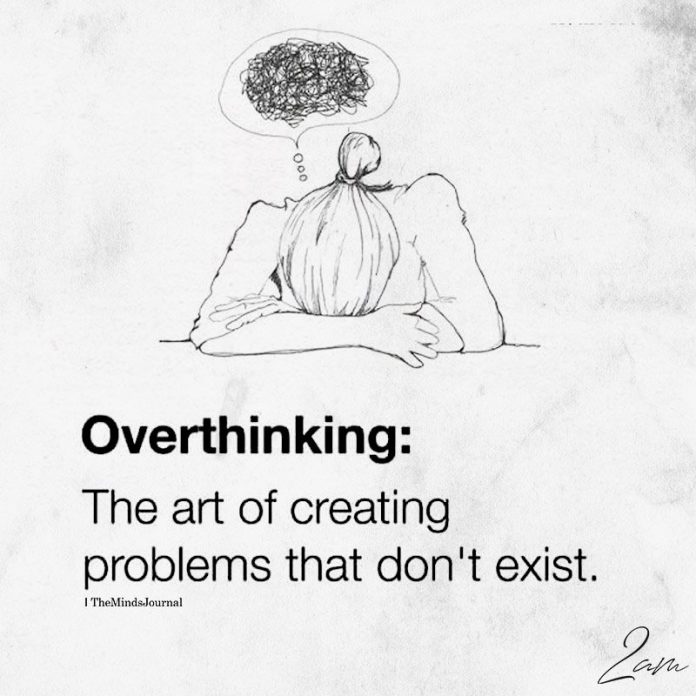Over-worrying and overthinking can really ruin the day if we don’t know how to manage it. As one of the most pervasive symptoms of anxiety, you must learn to control it, and that’s exactly what you’ll learn today.
Wouldn’t it be nice to just flip a switch and stop all the worry and monkey chatter? Well of course it would be awesome! Although not exactly a switch you can learn to pretty much stop overthinking dead in its tracks.
How do you do it? You must process the pending issues in your mind and give a finishing blow with a resolve. Let’s get specific…
Worry is damaging
You see, when we worry or spend too much time thinking about something, our minds are taxed. Even if we’re not thinking about it, the things that worry us remain as “pending issues” in our brains.
In fact, my Anxiety Warrior, these “pending issues” are so important that your anxiety can use them against you. The moment you process and fix those “pending issues” you remove anxiety’s “weapons” against you.
When we hold “pending issues in our minds” we are subconsciously overwhelmed by the open possibilities, and we especially feel down because of that one ugly possible outcome…. That catastrophic possibility we dread so much.
And this has a very strong emotional and mental impact on us. If you think about it, this is just like living under a constant threat.
So, how can we give this a solution? How do we take all those open possibilities, and the possibility of something awful; and reduce it to something non-threatening?
How do we become rational in face of all the dangers and worries? How do we close all those “open doors”? How can we have peace of mind again?

One by one
First, we take that one issue that is giving you trouble, the thing that worries you right now or the most recent one. I know there might be many things that worry you at the moment, but we just take one at a time. After you’re done with one you can follow up with the next one. Ready?
The solution is to make a plan. Making a plan has an extremely potent effect on a subconscious level and I will explain you how this happens.
Sounds crazy, right? I know, too simple to be true, but before you disregard all this as BS I invite you to read through and test it for yourself. It won’t take more than 5 minutes of your time and the reward will only be yours: Peace of mind, no more anxiety, no more overworrying/overthinking.
The many “flavors” of over-worry and overthinking
Overworry comes in many flavors. For example, you may spend too much time thinking about the tragedies that could befall you or your loved ones…
Or you may be overthinking about that time you screwed up or the time you made a fool of yourself, rehashing the situation once again in your mind…
Or let’s say you overworry about the dreaded palpitations and you fear anxiety might “get too physical” and you will end up in the hospital with a huge bill to pay!
Let’s close all those open doors!
A plan takes all those worries (or as we said before the “open doors”) settles most of them and allows us to solve the matter in a way that will lead us to what we truly want. A plan even covers the things that may be out of our control. At the end of the process, we achieve peace of mind and you will see the results yourself.
How can making a plan help in these situations? Furthermore, how would you make a plan in these scenarios? How good can a plan be against this? Let’s do it together so you can learn and do it yourself…
Related: 11 Ways To Put An End To Overthinking
Madonna
Let’s say someone, in this example, we’ll call her Madonna, is facing career problems. Let’s just say her last album is not performing as well as she had expected. So anxiety comes and makes a mess…
Anxious ideas cross her mind: “Crap! Why did you invest so much? Gosh, I shouldn’t have spent so much on production. Oh God, that music video was really expensive and it’s not doing any good. What am I going to do now? I won’t be able to pay investors, what is the board going to say about this? Hell and I’m already in debt!!”…
And on and on and on it goes Anxiety Warrior, you know how it goes… All those questions are the open doors. And it all stems from one central issue, a real issue:
The new album is not performing well. So that’s where we attack, at the core. Instead of worrying we make a plan and proceed to take action…
What can Madonna do about this? Up marketing efforts, increase social media activity, release the next single soon, knock 20% off for a weekend… you know, all that…
So then Madonna can cut the worry right there, before it starts growing.

50 shades of worry?
Now, there will be worries that we perceive as more “real” than others (farfetched ones can easily be discarded). And for all of them, one has to “close the door” too.
For example, Madonna is worrying about having spent so much on the video. That’s already done and there is no point in focusing on the past, those are things one can’t change. But what about being in debt? Well, that’s the next solution to plan, and she proceeds to make the plan right away…
Always remember this my Anxiety Warrior: The longer you take to make the plan, the longer it will be bothering you.
Madonna then decides to take some time to go through bills and accounts, she decides to set some money aside to pay the debt faster, even if this means less going out because peace of mind is more valuable than fun (one cannot truly have fun without peace of mind)
She also makes a plan on how to have fun even with a limited budget. And so Madonna has given a solution to the “pending issues”. But… what if worry still comes?
In the end, we haven’t solved the problem, we just made a plan, right? Well, wisdom comes in handy at this point…
Rejecting worry and anxiety
First, if worry comes one must make an effort to reject it, but now armed with our new shiny “weapon”: The plan.
Deep inside we are logical beings. And if anxiety comes disguised as worry but we have a plan, it will not be able to grip you because you have resolved those things that worried you. They are no longer “open doors”, you have closed all those and now have determined something that satisfies you. You are now a resolved mind.
Worry only comes to look for unresolved issues and since we are currently working towards the solution then it makes no sense to worry at all. With a plan, your mind will be able to understand this! Worrying won’t comfort you, it won’t help you, and it won’t speed things up. You can now drop it altogether because your mind is settled now.
Now it will be easy for you to reject worry. It has served its “purpose”: To draw attention to the potentially important stuff. But now that we have made EVERYTHING we can to solve it we don’t need it anymore…
Bye-bye, worry!
It is important that you truly carry out the plans you just made if you want to achieve peace of mind. Give your mind satisfaction, don’t leave it hanging.
Will anxiety try to grip you anyways? Yeah, probably, but it will be easier to overcome and it’s a perfect moment to exercise detachment…
You will observe a childish, “bully” behavior: Anxiety will try to hit you where it hurts and you must not react to this. That’s another exercise of detachment and stillness I will teach you in another article.
If you want to go through your specific worries just let me know. We can tackle them together in a completely free, no strings attached, Anxiety Breakthrough Session where you and I will go through the next steps you need to take in order to leave anxiety behind. Together we can cut through your anxiety and uproot it for good.
Related: Do You Worry Too Much? Here’s What You Can Do
Let’s wrap it up:
1. Make a plan. It must really cover everything that worries you and you have to take immediate action. You can do a list, number worries on the left, and write the plan on the right.
2. Since you are already doing everything you can to get those “pending issues” sorted out, it makes no sense at all to worry. This works on a subconscious level, and now your anxiety will not be able to “grip” you so easily. Your mind will be settled, Anxiety Warrior!
3. Start rejecting worry. By this moment, worry is reduced to what it is: Useless because you are now taking action. If you are already doing everything in your power you can easily reject worry and overthinking. Your mind will become “unsuitable” for worry and anxiety.
4. Determine the next steps, settle your worry constantly, stay in constant action and leave worry behind.
Thanks for reading! If you have any suggestions or a specific aspect of anxiety you want me to cover or explain just leave a comment and I will gladly help you!
You are unbreakable
Always remember: Your mind is unbreakable. By transcending suffering you will just become stronger. Let’s do it together, Anxiety Warrior!
George Alonso,
Master yourself, master your life.
Written By George Alonso Originally Appeared In George Alonso









Leave a Reply
You must be logged in to post a comment.